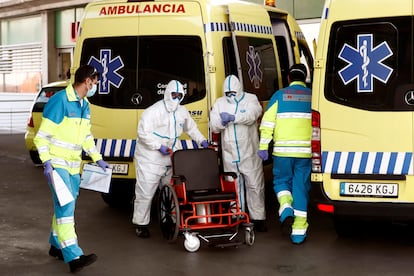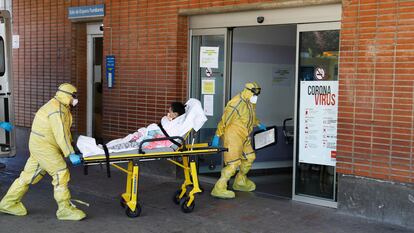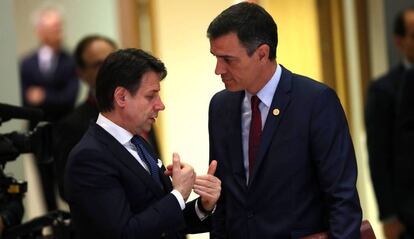Spain records highest daily rise in coronavirus deaths with 769 fatalities
Government says protective gear is on its way, and insists the food supply chain is guaranteed

The latest official figures released by the Spanish Health Ministry on Friday revealed that 769 people have died from the SARS-CoV-2 coronavirus in the last 24 hours – the highest daily rise in fatalities since the beginning of the outbreak. That brings the total number of deaths in the country to 4,858, making it the second highest toll in the world after Italy and ahead of China.
A total of 64,059 people have been infected according to official figures, a rise of 14% since Thursday. More than 36,000 people are currently in the hospital, and of these, 4,165 are in intensive care, a day-on-day increase of 13%. Meanwhile 9,357 patients have recovered and have been released from hospital, representing almost twice the number of deaths.
Daily rise in coronavirus deaths and confirmed cases in Spain
In Madrid, 322 coronavirus deaths were recorded in the last 24 hours, while in Catalonia that figure was 208.
Speaking at the daily press conference on Friday, Fernando Simón, the director of the Health Ministry’s Coordination Center for Health Alerts, said that Spain may be “approaching the long-awaited peak” in coronavirus infections, explaining that the number of cases had risen by a smaller percentage with respect to the past 15 days.
“We have to prudent with these figures. But it is a promising figure that gives certain hope,” said Simón.
The health expert also warned that “a drop in transmission will not be accompanied by a drop in use of the healthcare system.”
Cabinet meeting

The Spanish Cabinet held an extraordinary session on Friday, followed by a news conference at which the health, finance and labor ministers offered new information on the coronavirus crisis.
Labor Minister Yolanda Díaz warned that this crisis cannot be used by employers as an excuse to fire workers, and said the government is temporarily restricting layoffs based on force majeure or for economic, technical, organizational and production reasons alleging the effects of the coronavirus. Temporary contracts will also remain in force for the duration of the crisis. Díaz said the government would also review all the temporary layoff plans (ERTEs) that are currently being filed by numerous companies, and which are the government’s preferred channel for businesses to adapt to the economic slowdown.
“The ERTEs were created specifically for this health crisis, and I urge the business community to lead by example, to show commitment to the people and to preserve jobs,” she said, cautioning that “we are going to do routine checks, and if we see any fraud, the companies will have to pay back every last cent, including employees’ unemployment benefits.”
Asked about the rapid diagnostic tests recently purchased from China that turned out to be unreliable, Health Minister Salvador Illa said a new shipment will arrive in the coming days. “And the tests that failed are not going to influence the evolution of the disease,” he said. “We do between 15,000 and 20,000 tests a day in Spain, and we are making efforts to buy fast tests.”
Illa sought to allay concerns that Spain, one of the world’s worst-hit countries, is desperately short of protective gear and medical equipment to deal with the crisis. “Seven million face masks are being distributed today,” he said. “The government continues to work to acquire all the products to wage this battle. We have closed contracts worth €578 million to purchase products.”
Finance Minister María Jesus Montero, who is also the government spokesperson, said that ministries are already working on plans in case the government should decide to enforce even stricter measures in a country that went into lockdown on March 14. “Our measures are the most drastic of all the ones that have been implemented,” she said. “We know they are life-altering.”
Montero also underscored that supermarkets in Spain remain well stocked and that the supply chain is guaranteed. “Spaniards have nothing to fear because they are going to find products at the supermarket.”
Health workers affected

Simón reported on Friday that 9,400 health workers in Spain had contracted the coronavirus, 14% of the total. “It is one of our concerns and we are working on it,” he said.
In the southern region of Andalusia, 872 of the 3,793 coronavirus cases are health workers, according to the regional government. In Madrid, 2,600 workers have been infected or are in quarantine.
On Friday, the premier of the Madrid region, Isabel Díaz Ayuso, announced the launch of a free hotline for people in need of psychological help during the coronavirus crisis.
First Mosso death
The joint operational director of the National Police, José Ángel González, paid his condolences on Friday to the family of the first officer from the Catalan regional police force, the Mossos d’Esquadra, to die from the coronavirus.
Also on Friday, Defense Chief of Staff Miguel Ángel Villarroya reported that 172 members of the Armed Forces had contracted the disease.
So far, three members of the Civil Guard have died from Covid-19 and another 282 have been infected. The force is the worst-affected of Spain’s law enforcement agencies so far.
EU summit makes little headway

European leaders failed on Thursday to reach an agreement on an action plan to deal with the economic fallout of the coronavirus crisis. The goal of the European Union summit, which was held via video link, was to agree to a “coordinated strategy” that would help the continent to recover economically and socially once the pandemic was over. But the 27-member bloc remained deeply divided on the issue.
Spain, Italy and France are pushing for a “Marshall Plan” that would involve massive public investment in the continent. But this plan, proposed by Spanish Prime Minister Pedro Sánchez, was met with fierce opposition by Germany and the Netherlands, as well as Austria and Finland, which are unwilling to share the costs of the worst health crisis Europe has seen in recent times. Instead, the northern EU countries want each nation to individually manage their economic response to the pandemic.
“The problem is that the coronavirus crisis has not yet hit all countries equally,” said a diplomatic source from a southern EU country.
The summit was close to ending as a complete failure when Sánchez and Italian Prime Minister Guiseppe Conte refused to support a joint declaration filled with vague statements and without any concrete measures. The pressure from Spain and Italy forced the EU to agree to come up with a plan to address the crisis within 15 days.
According to diplomatic sources, the vague declaration appeared to have complete consensus, but when the president of the European Council Charles Michel asked all the participants if they were in agreement, Sánchez replied “no.” The Spanish prime minister warned that he would not support “any agreement that does not set a clear mandate so that economy ministers can continue working [on a plan to tackle the crisis],” the sources added.
The threat of a veto, backed by Italy, forced Michel to redraft the text, and after six hours of negotiations, the bloc agreed to give economic ministers a 15-day deadline to come up with a new plan.
With reporting by Pablo Linde, Bernardo De Miguel, Lluís Pellicer and Carlos E. Cué.
English version by Melissa Kitson.
Tu suscripción se está usando en otro dispositivo
¿Quieres añadir otro usuario a tu suscripción?
Si continúas leyendo en este dispositivo, no se podrá leer en el otro.
FlechaTu suscripción se está usando en otro dispositivo y solo puedes acceder a EL PAÍS desde un dispositivo a la vez.
Si quieres compartir tu cuenta, cambia tu suscripción a la modalidad Premium, así podrás añadir otro usuario. Cada uno accederá con su propia cuenta de email, lo que os permitirá personalizar vuestra experiencia en EL PAÍS.
¿Tienes una suscripción de empresa? Accede aquí para contratar más cuentas.
En el caso de no saber quién está usando tu cuenta, te recomendamos cambiar tu contraseña aquí.
Si decides continuar compartiendo tu cuenta, este mensaje se mostrará en tu dispositivo y en el de la otra persona que está usando tu cuenta de forma indefinida, afectando a tu experiencia de lectura. Puedes consultar aquí los términos y condiciones de la suscripción digital.









































